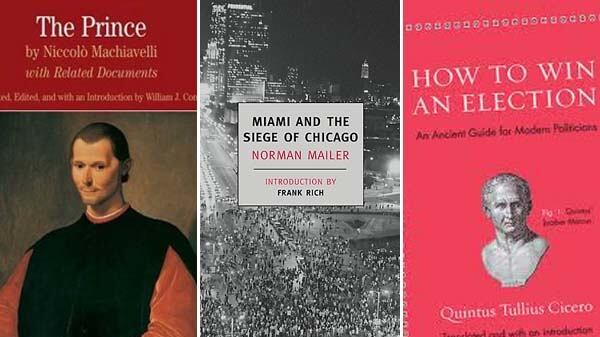As the race pitting President Obama against Mitt Romney officially begins, campaign coverage gains superficiality and confusion. The entertainment extravaganzas of the respective party conventions now include a film star having an incoherent conversation with an empty chair. The presidential election season is quickly becoming an art piece in the theater of the absurd.

Concerned citizens and voters looking to better inform themselves on the structural mechanisms and personality dramas that define political campaigns may want to spend some time over the next couple of months away from the television and the blogosphere, and inside the pages of political campaign classics. They are books that, because of their depth of insight, quality of prose, and enduring relevance, offer an education far beyond what typically passes for analysis and commentary during the political Super Bowl.
Readers would be wise to begin with these 10 must-read books:
How To Win an ElectionBy Quintus CiceroIn 64 B.C., Cicero wrote his older brother a letter of advice guiding him on how to win his race for consul. Nearly 3,000 years later, it remains stunningly relevant, and it emerges as key evidence that some things never change, like political trickery, tactics of manipulation, the art of making a sale. Cicero advises his brother to “promise everything to everyone,” attack his opponents with allegations of sexual misconduct and financial impropriety, and play the common man to the crowd, while reassuring the elite that he is secretly on their side. It is a book that reads as if it were written by David Axelrod or Karl Rove, who incidentally provides a glowing blurb on the back cover of one of the editions.
The PrinceBy Niccolo MachiavelliMuch like Cicero’s letter to his brother, Machiavelli’s letter remains resonant, powerful, and educational years after its author’s death. Published in 1532, The Prince continues to stand uncontested as the greatest—albeit one of the most cynical—manual for keeping political power. Machiavelli writes that the people want a leader who rules with an iron fist in a velvet glove, and that it is far better to be feared that it is to be loved. His work is not for the faint of heart or the enraptured idealist, but its realism cuts to the core of power maintenance—whether it regards an Italian kingdom or an American election.
The Outrageous Barriers to Democracy in America By John R. MacArthurIf national campaigns are exhibitions of elaborate theater and Cicero and Machiavelli wrote scripts that candidates would be wise to recite, MacArthur, the former investigative reporter and publisher of Harper’s Magazine, cuts down the curtain to expose the direction, stage setting, and choreography that takes place behind the scenes. Every four years, politicians from both major parties earn applause for talking about how American democracy is the only place where their dream of gaining power could come true. Barack Obama in 2004 and Marco Rubio in 2012 sold this story particularly well, but MacArthur proves that story is a myth. “The outrageous barriers to democracy,” as he calls them, include the pressure of party politics, the influence of large donors, and the demands of the mass media. MacArthur’s undressing of the American mythos posits that perhaps you can be president, but before you think about it, you better have the connections necessary to earn the approval of a major political machine, raise hundreds of millions of dollars, and please the media outlets that not only report, but shape the news. Originally published as You Can’t Be President and recently reissued with the new title and a new preface, this book validates the late Vidal’s aphorism: “Anyone prepared to run for president should be immediately disqualified from doing so.”

Washington D.C. By Gore VidalVidal dramatically, amusingly, and compellingly demonstrates the veracity of his aphorism on presidential races in his novel Washington D.C.. Part of his Narratives of American Empire series of historical novels and taking place from the 1930s to the 1950s, Washington D.C. tells the story of a conservative senator with presidential aspirations, a young, charming congressional aide who also has his eye on the throne, and a ruthless newspaper tycoon who, more than the politicians, understands the importance of image over substance in political life. Much of the book reads like a brilliant soap opera, but behind all the illicit sex, backstabbing, and backroom deals, emerges an engaging and entertaining portrait of how the political process degrades those who participate within it, and victory is possible only for those who gleefully accept their degradation.
Hartsburg, USA By David MiznerMizner uses his experience as a political consultant and speechwriter to write a more hopeful novel than Vidal’s Washington D.C. Hartburg, USA chronicles a school-board race in a small Ohio town between two clichés of the culture wars—a liberal atheist who once worked as a Hollywood screenwriter and a fundamentalist Christian woman from the nearby megachurch. Mizner wrote the book before Sarah Palin became a household name, but his Republican candidate for school board is the literary Palin if there ever was one. The way in which the novel depicts the personal details of each character’s family, and the way in which he leaves hope for unity, uplifts the reader into remembering, or at least believing, that the distance we see between us and our political opposites is often imaginary. Considering that Obama versus Romney is one of the most negative races of recent history, Mizner’s smart and moving novel may act as an anodyne.
The Boys on the Bus By Timothy CrouseOnce upon a time in a galaxy far, far away, political campaign operatives found it difficult to deceive the press, and “spin” was not as routine in politics as affixing a flag pin to a lapel and taking photos in costume like hunting gear, flight suits, shirtsleeves, and baseball caps. Crouse’s classic gives a brilliant line-by-line, play-by-play account of the 1972 presidential race when the Nixon and McGovern campaigns originated the art of spin—and with newfound boldness and dedication, attempted to control the narrative of the campaign. As a journalist for Rolling Stone, Crouse spent time with the press following the candidates around the country, and he had the observational skills and insight to capture the changes in the media and in politics that would eventually dominate the discourse decades later.

Fear and Loathing on the Campaign Trail ’72 By Hunter S. ThompsonThompson writes the foreword to Crouse’s The Boys on The Bus, but manages to overshadow Crouse’s book on the 1972 race with his own. Thompson was one of the creators of New Journalism, and is rightly considered one of its greatest practitioners. With color, vulgarity, and brilliance, Thompson makes it clear how and why he unabashedly supports McGovern over Nixon. But when meets Nixon and they discuss football in the back of a limousine, he is able to humanize the reptilian president. Fear and Loathing on the Campaign Trail ’72 is not only a classic of political reporting, but a classic of all journalism.

Miami and the Siege of Chicago By Norman MailerMailer, like Thompson, helped pioneer and eventually mastered the art of literary journalism. In Miami and the Siege of Chicago, one of America’s best and most interesting writers takes readers to the Republican and Democratic conventions of 1968, and then proceeds, with the wildness of a drunk and the precision of a surgeon, to eviscerate both Richard Nixon and Hubert Humphrey. Armies of the Night, Mailer’s account of an anti-Vietnam war march on the Pentagon, is his best-known work of journalism, but Miami and the Siege of Chicago may be his clearest, smartest, and toughest. In 2012, it comforts readers who are aggravated with how most presidential elections devolve into a contest among two men vying to emerge as the least reviled character, and it afflicts those who believe in the integrity of the American political system. Mailer is also able to powerfully capture the chaos of Chicago where, under the order of Mayor Daley, the police rioted against a group of antiwar protesters.

McCain’s Promise By David Foster WallaceWallace’s essays on the porn awards ceremony in Las Vegas, a lobster festival in Maine, and the Illinois State Fair allowed him to prove that he was the modern master of literary journalism. In McCain’s Promise, originally titled Up, Simba, Wallace was able to turn his sense of humor, intimidating intellect, and unlimited curiosity onto the John McCain campaign in 2000. Wallace’s interpretations of campaign politics, media interaction, and the playful balance of authenticity and brand construction are fascinating, but the book soars when Wallace turns to unconventional sources of wisdom for help. Wallace forms the belief that cameramen, sound technicians, and other crew members are the most insightful and wise observers of American politics, because they follow the candidates across the country, are part of a small insider group, but have no ideological or monetary stake in the outcome of the race. He ends up being right. Wallace spends more time discussing politics with camera crew members over cigarettes than he does with political operators, and the book becomes essential reading.
The Obama VictoryBy Kate Kenski, Bruce W. Hardy, and Kathleen Hall JamiesonKathleen Hall Jamieson is the director of FactCheck.org and one of the best media and political analysts in the country. Along with her co-authors, in The Obama Victory she provides a thorough and irrefutable report on how Barack Obama managed to become president in 2008. With analysis and commentary that is both flattering and critical of Obama, the book serves as a case study of Cicero’s letter and MacArthur’s indictment of the structural aspects of American politics. The Obama Victory is important for understanding not only how Obama won in 2008, but how he will win or lose in 2012.






